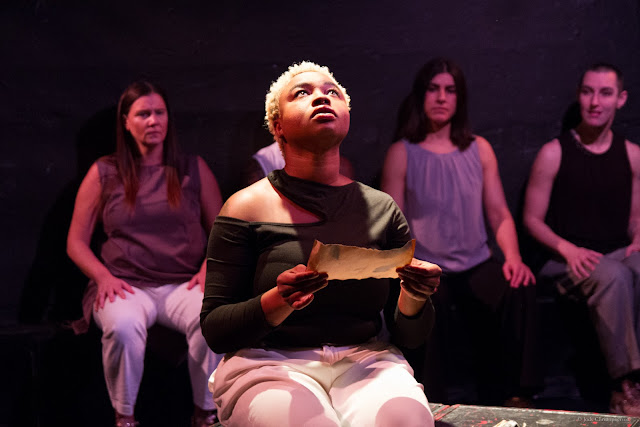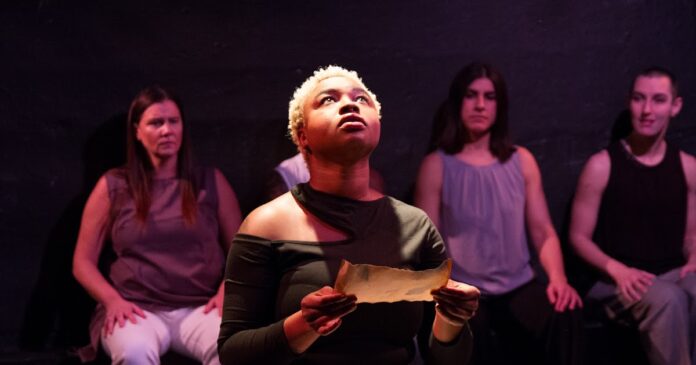Jody Christopherson
Curated From newyorktheatrereview.blogspot.com Check Them Out For More Content.
 |
| Elizabeth Kenny, Tanyamaria, Marisela Grajeda Gonzalez and C. Bain in a scene from April Ranger’s “Bathsheba’s Psalms, Or a Woman of Unusual Beauty Taking a Bath” (Photo credit: Jody Christopherson) |
Is there nudity? If so can you talk about how this is approached and how you made this choice?
April: No nudity – and that’s definitely a choice we made early on. This play asks an audience to consider their relationship to seeing and being seen, and so we discovered very quickly that we needed to create distance between our visual expectations and what we hear the actors say. The language itself conveys the violence, the sex, and nudity, so that our eyes and ears can pay attention to the world that the play creates, which often juxtaposes the violence in the narrative.
Christina: This production is really focused on playing rather than recreating. We’ve all seen the image of a woman being “taken” by a man, we all know what a woman in the tub looks like, I don’t think that the integrity of the play rests on recreating those images. One thing we learned in one of the workshops was that the audience needs to learn how to react to the play early on so that they can go on the ride with us. There are a lot of heavy themes in here, but we want the audience to be free to laugh at the absurdity of what’s happening onstage. To make that absurdity laughable there needs to be visible safety for the actors, and the images that we make needs to be subverting oppressive images we see every day but take for granted. This is part of why we cast the play the way we did. We felt that putting the language in the hands of those left out of traditional bible narratives, and having those people weave in and out of the story would offer the audience the right amount of distance to laugh, but still feel the weight of the story.
Christina, can you talk about the process you and April are using to approach staging this work? What’s happening with the fruit?
Christina: I think the above about recreating images with an eye towards subversion and satire covers most of what our process has been like. Fruit is mentioned throughout the play and makes a few appearances as edible bouquets and baskets. Fruit as a sensual consumable/stand in for a woman’s body is still all over the media, and maybe that began with the bible?
Best thing you’ve ever made?
Christina: Theatrically? Little moments in all the plays I’ve worked on. I’m not ready to name anything “best” since it all feels like it is on the same continuum. Every time I’m better, so every time it is best until the next time.
April: Ha, I was waiting to see what Christina would say. Honestly I’ve been thinking about this question for days now, and all I can think about is how we say that we “make” mistakes. Which is definitely not a “best” kind of thing – but I do think that the hardest lessons I’ve learned so far have come from mistakes I’ve made, and those lessons have taught me how to deeply feel the blessings in my life right now. So in some ways those mistakes, coupled with learning, feel like creative acts worthy of my gratitude.
Impossible thing you would make if there were no limitations?
April: I know this question should make me think about what’s possible for the stage, but honestly if I had no limitations I would re-think our rehearsal structures. For instance, in addition to paying all collaborators tons of money, I would hire a chef to assist us throughout the rehearsal process, and we would share a meal together at every rehearsal, to ensure that everyone is eating a good meal every day while we collaborate. When I used to work at fancy restaurants, family meal before a shift was such a gift, and I’d love to implement that as a theater-making norm.
Christina: Yes to chefs! I’d add a long long rehearsal period, then a long long preview period. These are not impossible things, but maybe impossible for me right now in terms of how many resources I have. Something that feels impossible right now is finding time for think/dream time in between decision time.
Advice you would give to your younger self, a theatermaker just starting out?
April: Trust your gut instincts. If something is giving you a weird feeling, whether it’s a collaborator, or an institution, or the way a scene feels dishonest somehow, don’t ignore it or talk yourself out of feeling it in order to keep some kind of “peace.” Investigate internally what’s causing that weird feeling and then act accordingly.
Christina: I’d echo this from April and also say to find mentors who are making the kind of work that you really love. Even if you can’t be in the same room as that person, finding theatrical work that makes you feel really excited and figuring out why you’re so excited is a worthy exercise.
Tanyamaria
Elizabeth Kenny*
TL Thompson*
C. Bain*
Marisela Grajeda Gonzalez

